
News |
- Manitoba Leads Canada in Percentage of Intact Forests
- 4th World Water Forum Concludes
- Ontario Announces Alternative Energy Program
- BC Charges $173,000 for Information
- Pressure Growing For Ontario Moratorium
- Happy 70th Birthday to Dr. David Suzuki
- Canada On Side of Terminator Technology?
- Celebrate World Water Day - March 22nd
- Ontario Forests Targeted in Campaign
- Steelworkers Adopt Environmental Policy
- Manitoba Hydro Documentary at DC Filmfest
- Cree Leader Made Protected Areas Possible
| Manitoba Leads Canada in Percentage of Intact Forests | 03 April 06 |
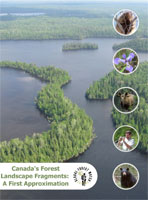 Global Forest Watch (GFW) Canada has released its most comprehensive survey to date that illustrates just how much of Canada's enormous area of forest is left, and which forest areas are heavily fragmented. Global Forest Watch (GFW) Canada has released its most comprehensive survey to date that illustrates just how much of Canada's enormous area of forest is left, and which forest areas are heavily fragmented.The report, mapping and GIS data set for Canada's Forest Landscape Fragments: A First Approximation was released March 22, 2006. Manitoba Wildlands did its own analysis of the GFW Canada data to determine the percentage of intact forest area as compared to total provincial/territorial forest area for each Canadian province and territory. According to GFW, 83% of the forested areas of Manitoba are intact - the highest proportion in the country (aside from Newfoundland and Labrador) for provinces south of 60°! Saskatchewan is second, with 74% of its forests as intact forests. The multi-year project set out to map Canada's remaining forest landscapes for the boreal and taiga forest regions, and for the temperate forest regions. Forest landscapes are becoming increasingly rare at the global level, due in large part to vulnerability to industrial development. In Canada, the challenge is to shape the future of intact forest regions, to determine how to balance protection and sustainable economic development - while it is still possible to do so. "These findings underscore the need for Canada to manage our remaining wild forest landscapes in a precautionary manner," says Peter Lee, ecologist and executive director of Global Forest Watch Canada. View the March 22, 2006 Global Forest Watch Canada press release (PDF) View Manitoba Wildlands' analysis of the Global Forest Watch data (PDF) View the Global Forest Watch Canada backgrounder (PDF) View the Global Forest Watch Canada report Canada's Forest Landscape Fragments: A First Approximation View Manitoba-specific maps from the report: map 1, map 2 Visit the Global Forest Watch data warehouse for the report's GIS dataset Source: Global Forest Watch Canada |
|
| 4th World Water Forum Concludes | 30 March 06 |
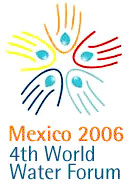 The 4th World Water Forum concluded in Mexico City, with the celebration of World Water Day on March 22nd. The 4th World Water Forum concluded in Mexico City, with the celebration of World Water Day on March 22nd.As part of the Forum, reports on water issues were released by various organizations to call attention to challenges to the management, governance and protection of global water resources. The World Water Council in partnership with Green Cross International, Académie de l'eau, Alliance Maghreb Machrek and the International Secretariat for Water released a report entitled The Right to Water: from Concept to Implementation. The report identifies conditions necessary for effective implementation of the right to water and in particular the necessary involvementof all stakeholders at the local and national levels. UNESCO spearheaded the release of the second edition of the World Water Development report entitled Water: A Shared Responsibility, which is the result of collaboration among 24 agencies involved in water resources management. The report stresses governance as key to addressing the global water crisis and tackling poverty. Visit the 4th World Water Forum web site View March 22, 2006 Manitoba Wildlands news item on World Water Day View Manitoba Wildlands Water pages content on the World Water Forum View the UNESCO-led second edition of the World Water Development report, Water: A Shared Responsibility View the World Water Council-led report, The Right to Water: from Concept to Implementation (PDF) Sources: World Water Forum, UNESCO, World Water Council |
|
| Ontario Announces Alternative Energy Program | 30 March 06 |
 Ontario's newly announced Standard Offer Program for alternative energy is being greeted with enthusiasm by environmentalists across Canada. Ontario's newly announced Standard Offer Program for alternative energy is being greeted with enthusiasm by environmentalists across Canada.The Standard Offer Program gives a fixed price and assured electrical grid access to wind, small hydro, solar and biomass energy producers. The policy has been extremely successful in Europe, Ontario's program is a first in North America. Municipalities, homeowners, private businesses and farmers will be able to build a wind turbine or put solar panels on their roofs and be paid a fixed premium to feed that electricity into the grid. "It's exciting because it will make it that much easier for Ontario to adopt renewable energy on a large scale," said scientist and broadcaster Dr. David Suzuki. "Ontario could quickly become a North American leader on clean, renewable energy." The March 21, 2006 announcement comes as Ontario is about to decide how it will produce and use electricity in the coming decades. The Ontario Power Authority is recommending new nuclear plants. However, the David Suzuki Foundation is urging the province to make renewable energy, efficiency and conservation the cornerstones of Ontario's energy policy. View the March 21, 2006 Government of Ontario press release View the March 21, 2006 David Suzuki Foundation press release View the March 21, 2006 British Columbia Sustainable Energy Association (BCSEA) press release View the March 21, 2006 Canadian Press article on Canada.com Sources: Government of Ontario, David Suzuki Foundation, BCSEA, Canadian Press |
|
| BC Charges $173,000 for Information | 27 March 06 |
 The BC government is asking for an unprecedented amount of money ($172,947.50) to hand over what should be public information, on BC's top corporate polluters. The BC government is asking for an unprecedented amount of money ($172,947.50) to hand over what should be public information, on BC's top corporate polluters.Sierra Legal Defense Fund asked the British Columbia government to release information about B.C. companies that have violated environmental laws and regulations. Non-compliance information on corporate polluters had been available to the public in BC until 2001. Sierra Legal's ongoing research shows five of the ten largest corporate donors to the BC Liberals in 2001 on recent non-compliance lists. BC Premier Gordon Campbell, as leader of the Opposition in 1998, lashed out at the government of the day saying that "Government information belongs to the people, not to government. This means, among other things, that all citizens must have timely, effective and affordable access to the documents which governments make and keep. Governments should facilitate access, not obstruct it." British Columbia's Information and Privacy Commissioner will hold an inquiry into the government's demand for nearly $173,000 from the Sierra Legal Defense Fund to process their request. View the March 15, 2006 Sierra Legal Defense Fund release View the 1998 letter from BC Premier Gordon Campbell (then Leader of the Opposition) (PDF) View the March 15, 2006 Vancouver Sun article View the March 16, 2006 Globe & Mail article Sources: Sierra Legal Defense Fund, Globe and Mail, Vancouver Sun |
|
| Pressure Growing For Ontario Moratorium | 27 March 06 |
 The Premier of Ontario continues to be deluged with hundreds of letters urging the Ontario governemnt to heed an urgent call by First Nations groups for an immediate moratorium on industrial development in Ontario's northern boreal region. The Premier of Ontario continues to be deluged with hundreds of letters urging the Ontario governemnt to heed an urgent call by First Nations groups for an immediate moratorium on industrial development in Ontario's northern boreal region."We are grateful for the support from across the province, the country and around the world," says John Cutfeet, spokesperson for Kitchenuhmaykoosib Inninuwug. "The government has to heed the will of the people and the decisions from the Supreme Court of Canada respecting the duty to consult with First Peoples." Kitchenuhmaykoosib Inninuwug and eight Ontario First Nations have called for a halt to all forestry and mining in their ancestral lands, stating that "the health of our ecosystems, waters and natural resources of our communities are endangered by mining explorations and other forms of resource development." Premier McGuinty made a promise to complete a comprehensive land use planning process in 2003, but has yet to act. "Sierra Legal has asked the province to explain how it intends to ensure that their rights are respected and ensure that meaningful consultations are undertaken prior to allowing any further exploration activities to occur," said Sierra Legal lawyer Justin Duncan. View Premier Ramsay's 2003 comments (PDF) View the March 20, 2006 press conference and accompanying media View the full March 20, 2006 Sierra Legal Defense Fund & Wildlands League release (PDF) Visit the Kitchenuhmaykoosib Inninuwug website Sources: Sierra Legal Defense Fund, Wildlands League, Kitchenuhmaykoosib Inninuwug |
|
| Happy 70th Birthday to Dr. David Suzuki | 24 March 06 |
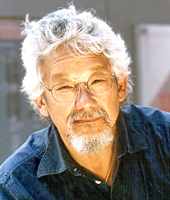 In honour of his 70th birthday on March 24, 2006, Dr. David Suzuki was presented with a collection of birthday messages from supporters of his environmental work from all over the globe! The surprise was orchestrated by the staff and board of the David Suzuki Foundation, who put the word out weeks in advance and asked supporters to contribute birthday wishes to celebrate this milestone. In honour of his 70th birthday on March 24, 2006, Dr. David Suzuki was presented with a collection of birthday messages from supporters of his environmental work from all over the globe! The surprise was orchestrated by the staff and board of the David Suzuki Foundation, who put the word out weeks in advance and asked supporters to contribute birthday wishes to celebrate this milestone.Dr. Suzuki has been in Winnipeg, Manitoba on numerous occasions in recent months. He spoke at the October 2005 Water for Life conference, at a municipal conference environmental conference in 2005, and in January 2006 as part of the University of Manitoba's Environment Week. Dr. Suzuki spoke about the importance of our fresh water resources, impacts of development on our boreal forests, and aboriginal rights. He also questioned the need to speed up expansion of Manitoba's system of dams. "David Suzuki is one of the best loved and most respected environmental advocates on the planet. We look forward to congratulating Dr. Suzuki on future momentous occasions - and to welcoming him to Manitoba again in the near future." said Manitoba Wildlands Director Gaile Whelan Enns. Visit the David Suzuki Foundation web site Send birthday wishes to David Suzuki: Suzuki70@davidsuzuki.org Source: David Suzuki Foundation |
|
| Canada On Side of Terminator Technology? | 24 March 06 |
 The UN Convention on Biological Diversity (CBD) meeting March 13-31 in Curitiba, Brazil will decide the fate of a 6-year de facto moratorium on "Terminator" technology. At stake are the huge profits a handful of biotech companies stand to make, and also more than 1.4 billion people who depend on farmer-saved seeds for their food security and livelihoods. The UN Convention on Biological Diversity (CBD) meeting March 13-31 in Curitiba, Brazil will decide the fate of a 6-year de facto moratorium on "Terminator" technology. At stake are the huge profits a handful of biotech companies stand to make, and also more than 1.4 billion people who depend on farmer-saved seeds for their food security and livelihoods.Terminator technology is known as Genetic Use Restriction Technology (GURT), a form of genetic engineering designed to produce plants with sterile seeds. Thousands of farmers and civil society organizations gathering in Brazil are demanding that it be banned forever. In Canada, hundreds of groups have signed on to the Ban Terminator campaign. They want Canada to explain its position. A leaked memo at a Bangkok CBD meeting in 2005 instructed the Canadian delegation to push for field-testing and commercialization, and to "block any other outcome". All eyes are on Environment Minister Rona Ambrose as the Canadian delegation led by Environment Canada heads to Brazil. "Terminator technology will be devastating," says Stewart Wells, President of the National Farmers Union of Canada. "Farmers rely heavily on saving seeds for replanting crops. Forcing them to buy seeds every year will mean huge increases in operating costs. Family farms will be forced out of business, while multinational seed companies reap higher profits and increase their control over the food system." View the March 13, 2006 National Farmers Union, Inter Pares and USC Canada media advisory Visit the 'Ban Terminator' site and Take Action View the March 22, 2006 GreenPeace article View the March 24, 2006 GreenPeace article Source: National Farmers Union, Inter Pares and USC Canada |
|
| Celebrate World Water Day - March 22nd | 22 March 06 |
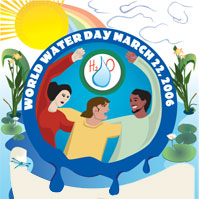 World Water Day, March 22, was designated at the 1992 United Nations Conference on Environment and Development in Rio de Janeiro. Raising awareness about preserving global water resources became the goal of World Water Day. This year communities across Canada will call for clean, accessible, public water for everyone. World Water Day, March 22, was designated at the 1992 United Nations Conference on Environment and Development in Rio de Janeiro. Raising awareness about preserving global water resources became the goal of World Water Day. This year communities across Canada will call for clean, accessible, public water for everyone.The 4th World Water Forum is taking place in Mexico City (March 16-22). The World Water Forum, an initiative of the World Water Council, has the aim of raising the awareness on water issues all over the world. The Council of Canadians (CoC) is marking World Water Day by highlighting the need for a national water policy in Canada, problems with privatizing water resources, and public-private water partnerships risks. The CoC is also promoting an alternative forum to the t at he World Water Forum. Activists and organizations from around the world will meet in Mexico City to take part in a citizens' water forum focused on promoting the right to water. The Council of Canadians, CUPE, KAIROS and Development and Peace are encouraging citizens to Take Action and send an electronic letter to Canada's federal and provincial politicians, voicing support for public control of water and people's access to safe, affordable water. Visit the Council of Canadians' World Water Day web page Send a letter to Canada's federal and provincial politicians, and to opposition critics Visit the 4th World Water Forum web site Sources: Council of Canadians, World Water Forum |
|
| Ontario Forests Targeted in Campaign | 20 March 06 |
This is the message sent by US-based conservation organization ForestEthics to Ontario Premier Dalton McGuinty as it rolled out its latest market campaign to put pressure on the government of Ontario to keep its promises and change its policies. Forest Ethics has released 'McGuinty's Index', research about the mismanagement of Ontario's forests - as a wake up call to the growing controversy in Ontario's Boreal Forest. "Ontario is home to some of the largest clearcuts in the world, while the government continues to allow logging in endangered caribou habitat," said Tzeporah Berman, program director at ForestEthics. "We're putting both the Ontario government and industry and major customers of Ontario's forest products on notice that they all have a responsibility and a capacity to take action to protect Ontario's forests," she said. View the March 1, 2006 ForestEthics press release View ForestEthics 'McGuinty's Index' (PDF) View the March 2, 2006 Globe & Mail article on ForestEthics.org Sources: ForestEthics, Globe & Mail |
|
| Steelworkers Adopt Environmental Policy | 20 March 06 |
 At the swearing-in ceremony for the newly elected officers of the United Steelworkers Union, the USW announced a formal alliance with the Sierra Club US, and also adopted, unanimously, a bold new environmental policy. At the swearing-in ceremony for the newly elected officers of the United Steelworkers Union, the USW announced a formal alliance with the Sierra Club US, and also adopted, unanimously, a bold new environmental policy.The policy calls for ending logging in the Tongass National Forest, protecting the Arctic Wildlife Refuge, and moving forward with massive investments in energy efficiency and renewables in sectors as diverse as transportation and construction. The United Steelworkers Union recently merged with PACE and now represents not only steel and aluminum workers but also hard rock miners; rubber, chemical, oil, and nuclear workers; lumber workers in Canada; and pulp and paper workers in the US. At 850,000 members, it is now the giant among America's industrial unions. View the Blog of Sierra Club US Executive Director Carl Pope Source: Sierra Club US |
|
| Manitoba Hydro Documentary at DC Filmfest | 16 March 06 |
 The National Resources Defense Council (NRDC) is sponsoring an advance screening of the controversial new documentary film Green Green Water March 17, 2006 for the DC Environmental Film Festival. Green Green Water depicts impacts from hydro development on northern Manitoba Aboriginal communities, as told by residents. The National Resources Defense Council (NRDC) is sponsoring an advance screening of the controversial new documentary film Green Green Water March 17, 2006 for the DC Environmental Film Festival. Green Green Water depicts impacts from hydro development on northern Manitoba Aboriginal communities, as told by residents.Susan Casey-Lefkowitz, from NRDC, told Manitoba Wildlands: "We know, from our work in Manitoba that the story told in this documentary, about the communities, rivers and lakes of Manitoba's boreal regions - is also about our consumption of energy. The NRDC-sponsored screening of Green, Green Water in Washington D.C. will increase awareness about the link between Canadian boreal hydropower and US energy consumption." Wuskwatim, the first hydro generation station in Manitoba since the 1980's, is to be located near Nelson House Manitoba. On site interviews there and with community members at Cross Lake Manitoba are central to the film's contents. View the full March 1, 2006 press release (PDF) View the December 15, 2005 Nisichawayasihk Cree Nation (NCN) letter (PDF) View the February 27, 2006 Filmmaker response to NCN letter (PDF) Visit the Green Green Water website Visit the DC Environmental Film Festival Source: Aquaries Media |
|
| Cree Leader Made Protected Areas Possible | 16 March 06 |
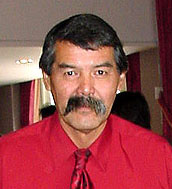 Francis Flett, a respected Manitoba aboriginal political leader known in Canadian Cree communities from Quebec to Manitoba, died March 10, 2006 after a long battle against complications of diabetes. Francis Flett, a respected Manitoba aboriginal political leader known in Canadian Cree communities from Quebec to Manitoba, died March 10, 2006 after a long battle against complications of diabetes.Flett was well-known in Canadian aboriginal circles as a humble man with a wealth of funny stories and a deeply held belief in the power of keeping the Cree language alive. Flett was lauded as a descendent of the historic Cree chief Big Bear, who inspired others with his sheer grit for his insistence on maintaining a grueling work schedule despite his medical condition. Manitoba Wildlands extends condolences to the family of Francis Flett, and to the Opaskwayak First Nation, for their loss. "We especially wish to acknowledge Grand Chief Francis Flett for his vision and wisdom in negotiating and signing Manitoba's First Nation Protected Areas MOU in 1998. Many protected area decisions flowed from his vision for protected lands where First Nation and Aboriginal rights are also protected," Gaile Whelan Enns stated. Visit the Opaskwayak First Nation website View the Union of BC Indian Chiefs Letter of Condolence View the Assembly of First Nations Statement on the Passing of Chief Francis Flett Visit the Assembly of Manitoba Chiefs View the March 16, 2006 CBC article Source: Winnipeg Free Press |
|


 RSS Feeds:
RSS Feeds: